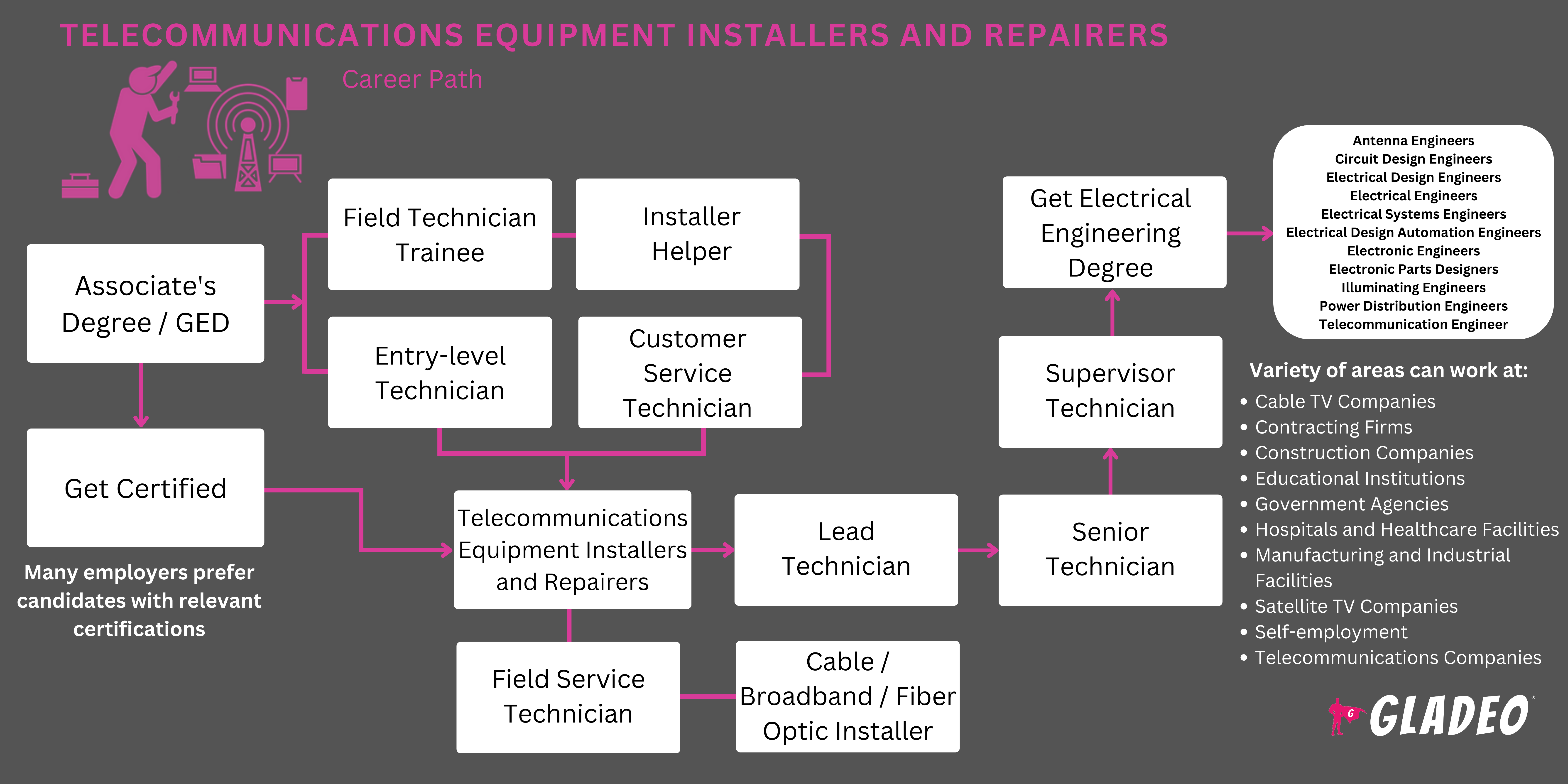聚光灯
Broadband Technician, Central Office Technician, Combination Technician, Customer Service Technician (CST), Field Technician, Install and Repair Technician, Installer, Outside Plant Technician, Service Technician, Telecommunications Technician, Cable Installer, Telecommunications Maintenance Technician, Telecommunication Specialist, Telecommunications Network Technician
Telecommunications Equipment Installers, aka telecom techs, work in a very specialized sector! They set up signal-carrying equipment, such as phone lines, routers, switches, and fiber optic cables. They also work with diagnostic and other tools to maintain, update, and fix items following manufacturer specs. Some installers work outside, logging everything they do, including calculating parts and labor costs. Others focus on home installations and repairs, setting up phone, Internet, and cable modems for residential customers.
Still others work at central offices or switching hubs, where incoming data is routed and amplified. At such sites, problems can be monitored and remotely corrected. The last type of Telecommunications Equipment Installer is stationed at headend control centers where they monitor cable network signals, similar to the functions of their peers at central offices. Despite the wide range of options within this career field, there are many similarities in education and training requirements.
- Working within the vital telecommunications industry
- Ensuring people can stay connected through phone and Internet
- Facilitating the distribution of news and entertainment resources
工作日程
- Telecommunications Equipment Installers may work outside or travel to residences to work inside homes or rooftops. They may offer round-the-clock response times, depending on the employer.
- Some telecom techs stay indoors, performing duties in central offices or headends, with night, early morning, or holiday shifts possible.
典型职责
- Install equipment and components in homes and offices, including buildings that may be under construction
- Set up, inspect, calibrate, test, and repair or replace routing equipment, wiring, and phone jacks
- Clean and lube equipment to keep it in good operational order
- Review blueprints and work instructions; run cables or wiring
- Refer to technical manuals as needed
- Work with various hand tools and diagnostic equipment
- Climb ladders to access rooftop equipment
- Work with customers to explain products and services
- Travel to various job sites (especially for residential installers)
- Collaborate with peers to identify and fix issues
额外责任
- Maintain records of work performed, including installations, maintenance, and repair work, as well as associated costs for parts
- Train ends users on operation, as needed
- Inspect and maintain work vehicle
- Install computer programs
软技能
- 独立工作的能力
- 关注细节
- 批判性思维
- 以客户服务为导向
- 良好的沟通技巧
- 良好的手眼协调
- 正常色觉
- Organized and methodical workmanship
- 健全的判断和决策
- 故障排除
技术技能
- 对计算机(PC或苹果)的一般熟悉程度
- Knowledge of Microsoft Office and Macintosh software
- Repair and installation skills
- 质量控制分析
- Fluke ClearSight Analyzer or Fluke Networks TechAdvisor Field Access System
- Communications server software such as IBM Domino
- 数据库用户界面和查询软件
- Industrial control software such as SCADA
- Internet protocol IP multimedia subsystem software
- Use of hand tools, such as wrenches, cable splicers, circuit testers, pliers, hex keys, scissors, screwdrivers, multimeters, stripping tools, tape measures, utility knives, wire cutters, and test sets
- 电信公司
- Electrical contractors
- Other technical service providers
- Cable networks
The life of a Telecommunications Equipment Installer isn’t always as glamorous as it sounds! Techs might have to climb, crouch, or crawl to access hard-to-reach areas. Once they get to those areas, they may have to take safety precautions to avoid injuries, such as electrical shock. At times they’ll need to move things around to gain access.
Because of the proximity to powered equipment and the need to work at heights sometimes, this field is exposed to higher than average risks of physical injury. Indeed, according to the Bureau of Labor Statistics, it has one of the highest rates of injuries out of all occupations. However, with proper training, precautions, and personal protective gear, workers are able to stay safe.
Another sacrifice is time. Some employers provide 24/7 availability for residential services. Headends and central offices might need employees to work shifts, holidays, or weekends. If you’re looking for a standard 8-5 job, this may not be the best fit!
The telecommunication industry is changing, with wireless and mobile services replacing older, less efficient technologies. As a result, the demand is shifting and also shrinking, as newer tech requires less time to install. It’s predicted that workers in this sector should beef up their credentials with an associate’s degree or higher, in order to stay competitive as older workers leave and companies hire fewer people to replace them.
For example, many residential cable providers simply mail customers a do-it-yourself kit instead of sending a technician out on the job. The Bureau of Labor Statistics points to a -3% decline in job growth in the coming years, compared to the national 4% average increase for other jobs. The key to staying relevant is to learn about current technology and systems while staying flexible enough to adapt as those change in the future, too!
Telecommunications Equipment Installers often enter the field after learning about it from a friend or family member. Many served in the military and received training that they put to use later as civilians. In general, employees in this field enjoy working with their hands and troubleshooting problems. They may have been inquisitive as kids, content to spend time digging into topics related to science and technology. To succeed in telecom, they need patience and the ability to read and understand relatively complicated texts, which are skills often learned at an early age.
- Telecommunications Equipment Installers usually have completed some college-level courses in electronics, telecom, or networking
- Some hold a vocational certificate; others may have an associate’s degree or higher
- 21% of workers in this field have a post-secondary certificate
- Most telecom techs are given thorough on-the-job-training (OJT) at their place of employment, which can last for months
- OJT involves working under the mentorship of a seasoned technician but may also include taking practical, hands-on courses
- There may be proprietary training related to specific equipment and software
- Core, Speciality, and Advanced certifications exist, too, such as:
- Broadband Premises Installer
- Certified Satellite Installer
- BICSI Installer 2, Optical Fiber
- Inside Electrical Craft Certification
- Expect to receive or to seek out continual refresher training to keep up with changes
- Telecommunications Equipment Installers might not need to attend a university. It can be faster and less expensive to complete courses at a vocational/community college that can teach you all the basic skills needed
- Decide if you want to pursue a certificate or go for a full associate’s degree
- If you are planning to take online classes, keep in mind that some coursework may be best learned in-person or via hybrid methods
- Try to look for courses in the latest technology, and that offer hands-on experiences
- Stock up on electronics and electrical courses
- Finish your certification and, if possible, an associate’s to help you stand out from the crowd
- Many Telecommunications Equipment Installers only hold a high school diploma, so look for apprenticeships or part-time work if you are taking classes
- Practice the art of reading technical books and instructions, to ensure you understand the actions you must take after reading
- Develop your soft skills, including customer service and clear speaking
- Work closely with your teachers and pick their brains for advice and mentorship
- Get as much practical hands-on experience as you can, and keep track of your academic and work achievements for your resume

- Finish your academics with a focus on the most current (and developing) technologies
- Let your applicable instructors or school know that you’re about to start job searching
- Sign up for alerts on job portals such as Indeed and Glassdoor, but also comb through Craigslist or other local sources
- If there is a specific company you want to work for, bookmark their website and visit the careers page often
- Many workers in this field received free, comprehensive technical training in the military, which has options for short terms of paid enlistment service plus tuition benefits
- Think about who you want to act as your references and ask them in advance; make sure they can speak or write about you in a positive, persuasive way
- Only apply for jobs you meet all the listed requirements for
- Review telecom resume templates to get an idea of how to fill yours out
- Polish those interview skills by practicing with sample telecom interview questions
- Stay current on trends and terminology by reading industry news (see our list of Websites in the Recommended Tools/Resources section below
- Know where you want to go with your career, and map out a plan of action
- Show up on-time and ready to go every day
- Be proactive and look for solutions before complaining about problems
- Do your homework and know what to do in situations before they arise
- Master your primary duties then ask for more advanced responsibilities
- Become a paragon of safety and always practice good procedures to mitigate injuries and downtime
- Add value to your workplace and become a go-to expert
- Be a team player but also hone your leadership skills and demonstrate decisiveness
- Take great care of your customers, whoever they might be. Positive reviews go a long way; so do negative ones
- Stay ahead of the curve by studying industry developments
- Participate in professional organizations and consider writing articles for publication
- Knock out additional certifications that can help you get ahead
- Train others to perform their duties correctly and safely
With the telecom industry evolving, some might be inclined to look for a more predictable career path with greater job growth potential. BLS offers a few alternative careers to consider:
- 广播、音响和视频技术员
- 电气和电子安装人员和维修人员
- Line Installers and Repairers
- O*Net Online features a few extra options to check out:
- Audiovisual Equipment Installers and Repairers
- Electronic Equipment Installers and Repairers, Motor Vehicles
- Radio, Cellular, and Tower Equipment Installers and Repairers
- Security and Fire Alarm Systems Installers
新闻联播

特色工作

在线课程和工具

年薪预期
New workers start around $62K. Median pay is $70K per year. Highly experienced workers can earn around $78K.






